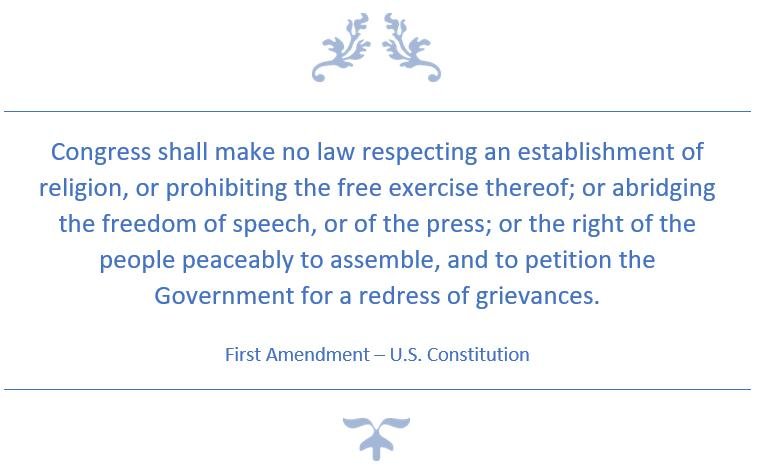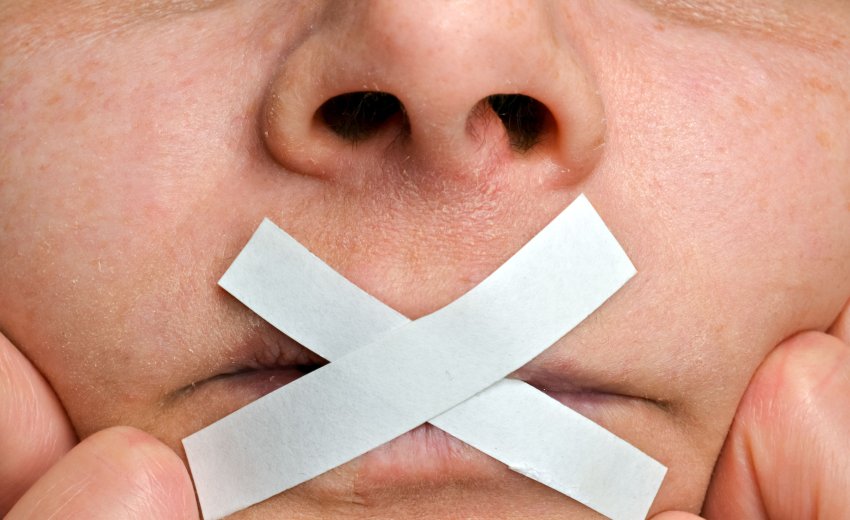First things first; neither of us is a lawyer.
Let’s explore the linear connection between the three terms in the title. The First Amendment speaks to the right of free speech. But there is a limit. We are not free to yell “FIRE!” in a crowded theater. Such speech can, and should, be censored, lest it pose a danger to others or to the social order. Your right to wave a fist ends where my nose begins.
Every one of us has the right to speak. People have the right to differ with words, especially if they do so without becoming disagreeable. We need to tolerate your right to speak but there is no accompanying obligation to be seriously heard, much less believed.
No matter how noble or vile, free speech is an absolute right guaranteed by the First Amendment. It matters not if your speech is politically correct or not. For classic examples troll through President Trump’s tweets any day of the week.

Apart from politically correct (or not) speech, the right also extends to insults tinged with religious hatred of selective faiths — insults to my God or yours? The defining test is disturbance of social order.
Don’t forget that while free speech provides both entertainment and frustration, it also leads us towards often-inevitable interreligious conflict.
A free press is essential to a free people. But what is “free press?” Will its free exercise sometimes be at the edge? Of course, it will.
Let’s first briefly explore the roots of a free press – The First Amendment.
This beginning statement of the rights and obligations of citizenship is clear that Congress shall make no law respecting an establishment of religion, or prohibiting the free exercise thereof; or abridging the freedom of speech, or of the press; or the right of the people to assemble peaceably, and to petition the Government for redress of grievances.
Inherent in The First Amendment to the Constitution then is the idea of protection of five basic freedoms: freedom of religion, freedom of speech, freedom of the press, freedom of assembly, and freedom to petition the government.
While the First Amendment gives us the right to speak our mind and not be afraid of punishment by the law, it does not protect us if, for example, a private organization bars us from using their site for our fulminations. In other words, we are out of luck if Twitter or Facebook ban us from their site since a private enterprise may have the right to control its domain. However, the law may save us if the government tries to stifle our voice and right to free speech.
Simply stated we have the right to publicly abuse the President and are not guilty of a crime, unless our action creates imminent danger to others, in which case the First Amendment may not save us.
In India, freedom of speech, though guaranteed, is not absolute. Unlike the U.S. Constitution, the text of India's Constitution clearly sets out restrictions on free speech. The freedom of speech guarantee under Article 19(1)(a) can be subject to reasonable state restriction in the interest of security, public order, defamation, decency or morality.
Sometimes governments and local satraps may be tempted to push the envelope beyond its limits.
For example, recently, in India the Police charged a few Indian Muslims with sedition. Why? Because they were celebrating a victory by Muslim cricketers from Pakistan over the largely non-Muslim Indian team. The justification for the arrest was that such a celebration might cause civil disturbance. A saner view might be that this arrest was an infringement of the basic right of freedom of expression. To be censored in the USA for speaking against the government would go against the freedoms guaranteed under the First Amendment.
In the religious sphere, where do insults to my God or yours lead us? They lead us to interreligious or interfaith conflict. But then there is intra-faith conflict which has been the most virulent type of conflict in history.
Societal discipline, religious or not, is meant to provide cohesion. Should it be used to control behavior or thinking of followers? Would that not be aping the Nazis and Stalinists of not so long ago? Think of Galileo and Thomas More et al. along with all those who were excommunicated, or even burned at the stake.
Sometimes, however, the demands of clarity require that we throw a spanner in the works. Just this month (December 2017) The New York Times revisited a case that has been dragging on since 2012 and is testing the boundaries of the First Amendment. A religious minded cake-baker in Denver refused to bake a wedding cake to celebrate the wedding of a gay couple. His defense: baking for gays would be an affront and infringement of his religious beliefs. The case is still alive, not entirely resolved.
As we said, neither of us is a lawyer, and the devil is in the details. It seems to us that if a business handles a product, it must not withhold its product on the basis of gender, race, color, nationality etc. Or is there something we are missing here?
A free press is essential to a free people. But freedom has its boundaries. A free press will be on edge — sometimes, if not often. To be legally banned, speech must be a true threat with both immediacy and actual intent.
Sharing of ideas depends on differences of opinions, or else there can be no exchange. Teaching and learning depend on it. Progress emerges from differences in ideas and nuances of interpretations.
Odd behavior for religious collectives that speak of God as love and of second chances! Mankind’s history of interfaith communication would make us wonder if it should be labeled free speech or hate speech. The fate of free speech often hangs by a thread, but it is a powerful idea.
In 1963 Yale University invited the segregationist governor of Alabama, George Wallace, for a speech. Just before his visit, Klansmen, perhaps encouraged by Wallace, bombed African-American school girls killing and injuring many. Many wanted the invitation to Wallace withdrawn. Yet, Pauli Murray, a Black lawyer, civil rights activist and a granddaughter of slaves, then pursuing her doctorate, argued that he be allowed to speak. She protested the content of his message but not his right to speak.
On the other hand, just weeks ago in November, 2017, Martha O’Donovan, a young American woman living in Zimbabwe, was arrested and now faces charges of attempting to overthrow the government because she tweeted against the President there. Imagine that! Note that we have always thought (and celebrated) the inseparable relationship between free expression and intellectual discovery.
The most recent manifestation of the nasty verbal – and sometimes physical – violence around free speech was the complete shutdown of Richard Spencer’s attempt to speak at the University of Florida in Gainesville. He was heckled, booed and harangued throughout his speech. Similar protests in Berkeley turned violent and forced the cancellation of Milo Yiannopoulos’ appearance.
Spencer, who is playing pied piper for white nationalism was in Florida to rally and rouse the faithful. Milo, a former Breitbart writer and protégé of Steve Bannon, is a prominent public intellectual for the far right who has fallen out of grace – at least for now.
One is reminded of the goings on in our Gurudwaras, especially the recent events in San Jose. A Kirtan divan by Ranjit Singh Dhadrianwale was interrupted by his opponents with loud chants of “Waheguru,” claiming they were only doing something the Guru condones: nam simran. Whether any violence ensued is uncertain but we have had our share of violent confrontations over the same principle – a la the disagreements over the Dasam Granth. Unwise and ill-thought, politically motivated edicts from the Akal Takht to silence people only add to the problem.
People like Spencer and Yiannopoulos argue that they are simply exercising their First Amendment rights. Their opponent’s argument -- that they should be stopped -- is based on the notion that they are inciting hate and indulging in political drama.
Are there limits to free speech? And if there are, who draws the line and where are the boundaries? Does this right come with responsibility? We know for instance, that in Germany, denying the holocaust is a punishable act. Likewise, in India there are laws that limit what you can say in public. Free speech advocates demand that the government be empowered to draw the line. But keep in mind that governments often have their own political agenda.
An interesting aside is how the alt-right has coopted free speech. It used to be that the right or the conservatives as reflected by the GOP were generally silent or opposed to issues of free speech. It was the so-called left that carried the banner of free speech. But by demanding that right extremists like Spencer be denied because it is hate speech, aren’t the leftist groups being shortsighted and just as bigoted? Antifa is a case in point.
Will it be right – or sensible – to allow governments to set limits on free speech? Imagine giving that right to President Trump and Attorney-General Sessions! They could shut down their critics, the very marginalized groups that are demanding such a ban – Muslims, immigrants, LGTB etc.
The question really boils down to how one should deal with opponents on a given issue. Limiting or banning the opposition, no matter how undesirable they may be, only gives them the higher moral ground. Shutting off Spencer only elevates him; it turns around and mocks those who are trying to stop him.
How did Guru Nanak deal with the opposition he faced? And we know that he faced considerable opposition – political, religious and social. The one thing that can be said with certainty is that the Guru never demonized or shut off anyone. He actually went out of his way to make contact with and engage in dialogue with disparate groups, many of them hostile to him. But he won them over with gentle persuasion, logic, humor, and sweetness of speech.
Will that work today? Remember that our primary connection with the world around us is largely through words.
Jab lug duniya rahiyae Nanak kitch suniyae kitch kahiyae — Guru Granth p. 660.
By I.J. Singh & Ravinder Singh Taneja [email protected] [email protected]





